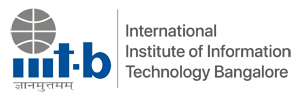- Academics
-
Research
-
Centres
- E-Health Research Centre (EHRC)
- Machine Intelligence & Robotics CoE (MINRO)
- Centre for IT & Public Policy (CITAPP)
- Cognitive Computing CoE (CCC)
- Centre for Accessibility in the Global South (CAGS)
- COMET Tech Innovation Hub (NM-ICPS)
- IIITB Innovation Centre
- Modular Open-Source Identity Platform (MOSIP)
-
Labs
- Surgical and Assistive Robotics Lab
- Graphics-Visualization-Computing-Lab
- Web Science Lab
- Multimodal Perception Lab
- Software Engineering Lab
- High Density Electronic Systems Lab
- Networking and Communication Lab
- Remote Sensing, GIS and Spatial Computing Lab
- Indian Knowledge System (IKS) Lab
- Smart City Lab
- Ascend Studio
- Radar Sensing Lab
- CSSMP
- Mahabala Ganaka Labs
- Advanced Wireless Communications Lab
- Speech Lab
- Connected Devices and Wearables Lab
- Outreach
- Publications
- Policy
-
Centres
- Placements
- Campus Life
- Media
- People
- About Us
The Data Sciences research domain focuses on all aspects of data management, processing, modeling, and information retrieval. The current areas of interest include:
Database Design, Information Retrieval, Network Analysis, Mining Latent Semantics, Data Mining and Data Warehousing, Knowledge Representatio and Reasoning, Linked Data and Semantic Web, NoSQL Databases, Stream Data Management, Multimedia Management using Control Theory, Analytics, Graphics & Visualization, and GPU Computing, Applied Machine Learning, Computational Social Sciences, Computational Topology.
Database Design, Information Retrieval, Network Analysis, Mining Latent Semantics, Data Mining and Data Warehousing, Knowledge Representatio and Reasoning, Linked Data and Semantic Web, NoSQL Databases, Stream Data Management, Multimedia Management using Control Theory, Analytics, Graphics & Visualization, and GPU Computing, Applied Machine Learning, Computational Social Sciences, Computational Topology.
- Center for Data Sciences
The Center for Data Sciences is a formal conglomeration of all the labs under the Data Sciences research domain, which takes care of overall activities at a higher hierarchical level of operation. This involves pooling in resources, conducting biannual student workshops, etc.
- Document Engineering Lab (Prof. Chandrashekar Ramanathan)
Documents still constitute a significant content type in the enterprise today. Document Engineering deals with developing algorithms, techniques, tools and processes that help in creating and manipulating the content, format, and representation of documents. There are several challenges being addressed as part of Document Engineering. The DocEng lab explores the various standards and tools available in this space. Following are some of the projects from the Lab:
- Pralekhasaara (for interactive content chunking and assembling)
- ORCA (Online Repository for Content Assembly)
- DocuBhasha (translation of documents, supported by Microsoft Research)
- Graphics-Computing-Visualization Laboratory (Prof. Jaya Sreevalsan Nair)
The Graphics-Computing-Visualization Laboratory (GVCL) at IIIT Bangalore works in the broad areas of graphics, visualization, and scientific computing. The GVCL is currently involved in projects related to three-dimensional visualization of LiDAR data, analytics work-flow visualization, small-world-network visualization, volume visualization, and GPU computing. The lab is funded by various projects from government agencies and the industry, namely, DST, Nvidia and EMC.
- Information Convergence Lab (Prof. Chandrashekar Ramanathan)
The revolution of mobile phones made media convergence possible. Today we don't need separate devices for talking on the phone, listening to music, watching videos, surfing the Internet, reading/sending e-mails. Information convergence is a similar concept that is focused on interoperability of information scattered across multiple dimensions and multiple sources and destinations. The focus of the Information Convergence Lab (I-COG Lab) is to first identify and define various information convergence challenges that are relevant to the real world. The current focus of the lab is to start with a study of information convergence challenges specifically targeted at large enterprises and the government. Based on this understanding of the needs and contexts of information convergence, the lab will specify reusable frameworks that address these challenges in a unified and integrated environment. The focus would be to develop standards-based solutions that can be applied widely.
- Multimodal Perception Lab (Prof. Dinesh Babu Jayagopi)
The Multimodal Perception lab focuses on human-centered sensing and multimodal signal processing methods to observe, measure, and model human behavior. These methods are used in applications that facilitate behavioral training, and social media analysis; and enable human-robot interactions (HRI). The focus is mainly on vision and audio modalities. Probabilistic graphical models form the backbone of the underlying formalism.
- Speech Recognition (Prof. V. Ramasubramanian)
The research focus related to automatic speech recognition is on current trends in deep-learning and machine-learning with a broader objective of integrating speech-specific knowledge and structures into the emerging neural architectural frameworks. Specific ongoing work spans end-to-end speech recognition, attention-based architectures, 0-speech, few-shot learning, co-articulation modeling, analysis-by-synthesis, speech recognition and translation engines in Indian languages, rich transcription and meta-data indexing of broadcast and telephony speech, associative memory models and speaker recognition for telephony voice biometrics.
- Web Science Lab (Prof. Srinath Srinivasa)
The Web Science Lab (WSL) at IIITB is focused on understanding the web in all its aspects. Research interests of the WSL include enabling technologies for the web, web-scale data management, web mining, network analysis and socio-cognitive models of web dynamics.
Faculty Members
- Prof. Amit Chattopadhyay
- Prof. Chandrashekar Ramanathan
- Prof. Dinesh Babu Jayagopi
- Prof. Jaya Sreevalsan Nair
- Prof. Manish Gupta
- Prof. Neelam Sinha
- Prof. V. Ramasubramanian
- Prof. Sachit Rao
- Prof. T. K. Srikanth
- Prof. Srinath Srinivasa
- Prof. G. Srinivasaraghavan
- Prof. Uttam Kumar
- Prof. Viswanath Gopalakrishnan






